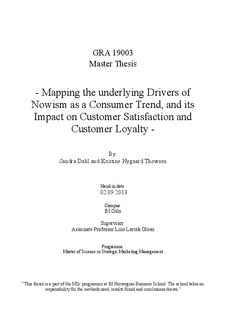Mapping the underlying drivers of nowism as a consumer trend, and its impact on customer satisfaction and customer loyalty
Master thesis
Permanent lenke
http://hdl.handle.net/11250/95133Utgivelsesdato
2014-02-11Metadata
Vis full innførselSamlinger
- Master of Science [1621]
Sammendrag
Every now and then, a powerful consumer trend surfaces, leaving companies no
other choice but to familiarize with the trend and its implications, and adapt to it.
Since first introduced as a consumer trend in 2009, nowism has received growing
attention as a trend that deserves recognition, yet no empirical research has been
conducted on this subject. This leaves managers with no information or guidelines
on how to handle this influential consumer trend. Our main goal with this
dissertation is to rectify this situation
We employ a combination of qualitative and quantitative methods, where our
objective is to explore the construct of nowism, identify its underlying drivers,
and uncover its impact on customer satisfaction and loyalty. We hypothesize that
positive life orientation; impulsive behavior; extraversion; and individualism, all
influence nowism positively. Moreover, we hypothesize that these relationships
are moderated by discretionary income and free time. Further, we employ a
segmentation technique based on life cycle, and hypothesize that the young, free
and simple segment is more likely to have a high degree of nowism compared to
the segments chaos in my life and got my life back. Lastly, we hypothesize that
nowism will have a negative effect on customer satisfaction and customer loyalty.
The Norwegian markets of grocery chains and mobile subscriptions are set as
contexts when assessing customer satisfaction and loyalty.
Data was collected using a combination of convenience and snowball sampling,
yielding a final sample of 378. Our proposed models are tested by employing
analysis of variance (ANOVA) and regression analyses, and further replicated by
using partial least squares (PLS). The results reveal that positive life orientation;
impulsive behavior; extraversion; and individualism all have a positive impact on
nowism. However, we found no moderating effects from discretionary income
and free time. Further, our research reveals that young independent individuals are
most likely to adhere to nowism. Lastly, we found no significant effects of
nowism on customer satisfaction and loyalty. Overall, our findings will help
managers gain a deeper understanding of nowism, and enable them to exploit
business opportunities related to the trend. This may in turn lead to competitive
advantages and economic prospering.
Beskrivelse
Masteroppgave(MSc) in Master of Science in Strategic Marketing Management - Handelshøyskolen BI, 2014
